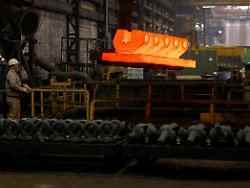“Recession is in the air”
German economy stagnates in the second quarter
07/29/2022 10:06 am
At the beginning of the year, the German economy grew faster than expected. In the second quarter, the development turns around: The low expectations of economists are even undercut. The Federal Statistical Office not only names the Russian attack on Ukraine as the cause.
The German economy stagnated in the spring. The gross domestic product was unchanged between April and June compared to the previous quarter, as reported by the Federal Statistical Office. Economists had expected growth of 0.1 percent. At the beginning of the year, however, the economy was doing better than expected: Destatis revised the increase in GDP for the first quarter to 0.8 percent from the 0.2 percent initially mentioned.
In the spring, the economy was mainly supported by private and government consumer spending, while the trade balance dampened economic growth. “The difficult global economic conditions with the ongoing corona pandemic, disrupted supply chains, rising prices and the war in Ukraine are clearly reflected in economic development,” said the Wiesbaden statisticians.
“With the crash of the purchasing managers’ index and the Ifo business climate, there is a recession in the air,” says economist Fritzi Koehler-Geib from the Kreditanstalt für Wiederaufbau (KfW) in a first statement. “In the past quarter, German economic output got away with scratches because the recovery in the service sectors, which were once restricted by the pandemic, has compensated for the decline in industrial production.” However, this catching-up process has largely been completed. Instead, there was a risk of a loss of purchasing power due to the massive increase in heating costs.
Federal Economics Minister Robert Habeck recently spoke of the “biggest energy crisis in Germany” – triggered by the heavy dependency on Russia. The International Monetary Fund (IMF) believes that the local economy will only achieve comparatively meager growth of 1.2 percent this year.
Unlike in Germany, the economy of the entire euro zone is still growing and even much faster than expected. In the second quarter, the gross domestic product (GDP) of the 19 euro countries grew by 0.7 percent compared to the previous quarter, according to the Eurostat statistics office. Economists had expected an average of 0.2 percent. Compared to the corresponding period of the previous year, the eurozone economy grew by 4 percent.
The development was similar throughout the EU. Among the countries that have already published data, Spain recorded the strongest growth in the euro area. Here the economy grew by 1.1 percent compared to the previous quarter. In Italy, GDP increased by 1 percent and in France by 0.5 percent. The German economy, on the other hand, disappointed with stagnation.
